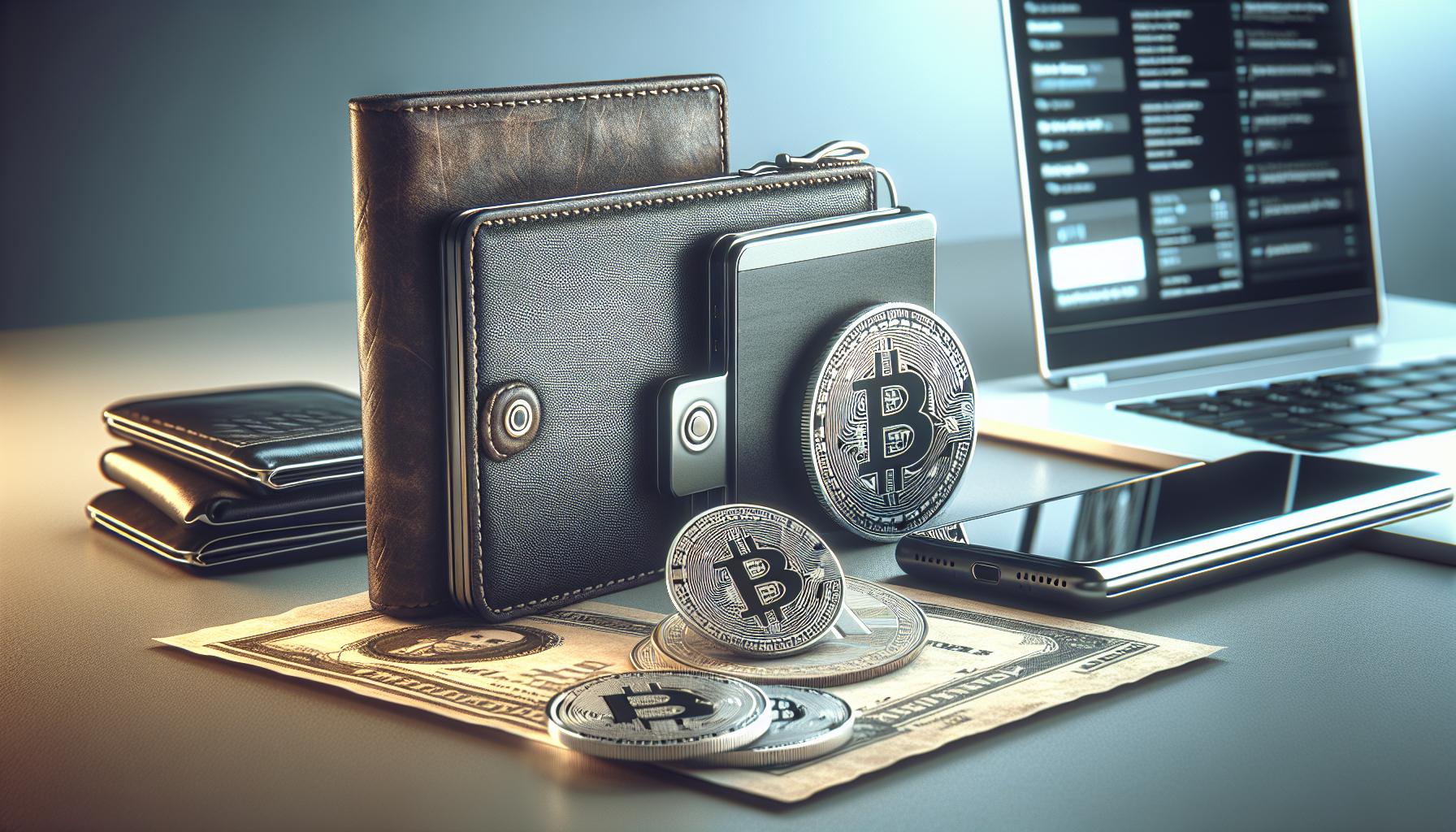Diving into the world of how is a cryptocurrency exchange different from a cryptocurrency wallet? Everfi. Two essential components you’ll encounter are cryptocurrency exchanges and wallets. While they may seem similar, they serve very different purposes in the crypto ecosystem.
I often hear newcomers confuse the two, thinking a wallet is just another exchange or vice versa. Understanding these differences is crucial for anyone looking to invest or trade in cryptocurrencies. In this article, I’ll break down what sets a cryptocurrency exchange apart from a wallet, helping you navigate your crypto journey with confidence.
- Distinct Functions: Cryptocurrency exchanges are platforms for buying, selling, and trading digital currencies, while wallets are primarily for securely storing, sending, and receiving these assets.
- Security Differences: Exchanges offer convenience but can be vulnerable to hacks, as they control user private keys. Wallets allow users control over their private keys, enhancing security, especially cold wallets.
- Types of Exchanges: Centralized exchanges are user-friendly and provide high liquidity but require trust in security. Decentralized exchanges prioritize privacy and control, using smart contracts for peer-to-peer transactions.
- Types of Wallets: Hot wallets (like web and mobile wallets) provide convenience for transactions but are less secure, whereas cold wallets (hardware and paper wallets) offer heightened security by storing assets offline.
- Importance of Understanding: Knowing the differences between exchanges and wallets is essential for effective crypto asset management and can prevent security risks and asset loss for investors and traders.
- Strategic Use: Efficiently navigating when to use an exchange versus when to use a wallet empowers users to maximize trading efficiency while ensuring the safety of their digital assets.
How is a Cryptocurrency Exchange Different From a Cryptocurrency Wallet? Everfi
Cryptocurrency exchanges and wallets serve distinct but complementary functions in the crypto ecosystem. Understanding these differences is essential for effective management of digital assets.
Cryptocurrency Exchanges
how is a cryptocurrency exchange different from a cryptocurrency wallet? Everfi. They function as intermediaries, enabling users to trade cryptocurrencies with each other or against fiat currencies. Notable features include:
- Trading Pairs: Users can exchange one cryptocurrency for another, such as Bitcoin for Ethereum, or trade against fiat currencies like USD or EUR.
- Market Orders and Limit Orders: Users can place different types of orders to manage their trades based on preferred pricing.
- Liquidity: Exchanges offer liquidity, providing users with the ability to easily buy or sell assets at any time.
Cryptocurrency Wallets
Cryptocurrency wallets allow users to store, send, and receive digital currencies. They maintain the private keys that control access to the cryptocurrency assets. Key characteristics include:
- Types: Wallets come in various forms, including hardware wallets, software wallets, and paper wallets, each offering different levels of security and convenience.
- Control: Using a wallet gives users full control over their private keys, providing heightened security compared to most exchanges.
- Transactions: Wallets enable direct transactions between users, bypassing exchanges if desired.
Exchanges serve as trading platforms, while wallets act as secure storage for cryptocurrencies. Understanding these differences enhances the ability to manage digital assets effectively.
Key Differences Between Exchanges and Wallets

Understanding how how is a cryptocurrency exchange different from a cryptocurrency wallet? Everfi. These tools serve distinct purposes within the cryptocurrency ecosystem.
Functionality
Exchanges facilitate the buying, selling, and trading of cryptocurrencies. They allow users to exchange one digital currency for another or convert cryptocurrencies into fiat currency. Exchanges provide features like trading pairs, enabling users to trade various cryptocurrencies against each other. In contrast, wallets focus primarily on securely storing, sending, and receiving digital currencies. Wallets don’t offer trading functions. Instead, they store private keys, enabling users to manage their digital assets directly without needing an intermediary.
Security Measures
Security differs significantly between exchanges and wallets. Exchanges utilize robust security protocols, such as two-factor authentication and encryption, but they remain vulnerable to hacks. Users entrust exchanges with their private keys, increasing the risk. Wallets, on the other hand, offer varying security levels based on their types. Hardware and paper wallets provide offline storage, making them less susceptible to cyber threats. Software wallets can be more user-friendly but often expose users to potential risks. Direct control over private keys in wallets grants users greater responsibility for their security.
Types of Cryptocurrency Exchanges

Cryptocurrency exchanges come in various forms, each with unique features and structures. Understanding how is a cryptocurrency exchange different from a cryptocurrency wallet? Everfi.
Centralized Exchanges
Centralized exchanges (CEX) act as intermediaries between buyers and sellers. They handle user funds and manage transactions, providing a user-friendly interface. Key characteristics of centralized exchanges include:
- User Accounts: Users create accounts to store their assets and track trades.
- Fiat Currency Support: They often allow users to deposit and withdraw fiat currencies, facilitating easier entry into the crypto market.
- High Liquidity: Centralized exchanges tend to have high trading volumes, ensuring faster transaction execution.
- Advanced Trading Options: They offer various order types, including market and limit orders, catering to diverse trading strategies.
However, I must trust centralized exchanges to safeguard my assets, which introduces risks related to hacks or regulatory issues.
Decentralized Exchanges
Decentralized exchanges (DEX) operate without a central authority, enabling direct peer-to-peer transactions. They prioritize user privacy and control over funds. Important aspects of decentralized exchanges include:
- Non-Custodial: Users retain control of their private keys and funds, reducing the risk of hacks associated with centralized platforms.
- Smart Contracts: Trades occur through smart contracts, allowing for automated execution without middlemen.
- Anonymity: DEX often requires minimal personal information, enhancing user privacy during transactions.
- Token Variety: Users can trade a wider array of tokens, including newly launched projects often not listed on centralized platforms.
While DEX may lack the user-friendly design of centralized exchanges, they offer increased security and control, aligning with my preferences for privacy and asset management.
Types of Cryptocurrency Wallets

how is a cryptocurrency exchange different from a cryptocurrency wallet? Everfi. Understanding these types helps me choose the right wallet for my assets.
Hot Wallets
Hot wallets connect to the internet, offering convenience for transactions and trading. They include:
- Web Wallets: Accessible via web browsers, allowing quick access from any device.
- Mobile Wallets: Installed on smartphones, simplifying transactions on the go with user-friehow is a cryptocurrency exchange different from a cryptocurrency wallet? Everfindly interfaces.
- Desktop Wallets: Downloaded software that provides a robust platform for managing digital assets on personal computers.
Hot wallets enable fast access and usability, ideal for frequent traders. However, reliance on internet connectivity increases vulnerability to cyber threats.
Cold Wallets
Cold wallets provide enhanced security by storing assets offline. They consist of:
- Hardware Wallets: Physical devices, like USB drives, which securely store private keys offline. They connect to devices only when needed.
- Paper Wallets: Physical documents containing private keys and QR codes, printed to offer a completely offline solution.
Cold wallets excel in protecting assets from hacking attempts, making them favorable for long-term storage. Though less convenient for daily transactions, their security features benefit users prioritizing safety.
Importance of Understanding These Differences
Understanding how is a cryptocurrency exchange different from a cryptocurrency wallet? Everfi. Each serves a distinct purpose, and misusing them can lead to security risks and lost assets. Knowing how to navigate both tools not only enhances my trading efficiency but also safeguards my investments.
Cryptocurrency exchanges play a central role in buying and selling digital currencies. They facilitate transactions, provide liquidity, and offer trading features that help me maximize my trading strategy. Recognizing that exchanges require trust in their security measures influences my decision on where to trade.
On the other hand, cryptocurrency wallets are essential for securely storing my digital assets. They safeguard my private keys, giving me direct control over my funds. Different wallet types provide various security options, so choosing the right wallet for my needs directly impacts the safety of my cryptocurrencies.
Differentiating between how is a cryptocurrency exchange different from a cryptocurrency wallet? Everfi. Knowing when to use an exchange for trading and when to rely on a wallet for storage prevents common pitfalls. This understanding shapes my overall approach to cryptocurrency investing and trading, enhancing my confidence in the marketplace.
Understanding the differences between cryptocurrency exchanges and wallets is crucial for anyone venturing into the crypto world. While exchanges facilitate trading and convert currencies, wallets prioritize the secure storage and management of digital assets.
By recognizing their unique functions I can navigate the crypto landscape more confidently. Choosing the right tools for my needs not only enhances my trading experience but also protects my investments from potential risks. With this knowledge I’m better equipped to make informed decisions and maximize my success in the cryptocurrency market.



